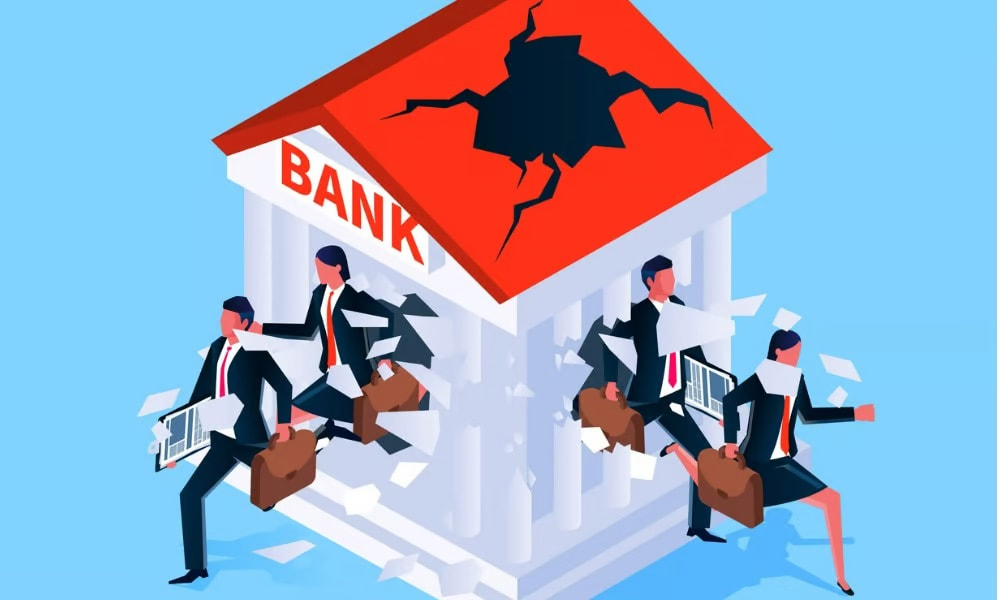|
Surveyed economists expect credit to crimp by twice as much as Fed chair Powell anticipates.
US bank stress will tighten credit by twice as much as expected by Federal Reserve Chair Jerome Powell, said economists surveyed by Bloomberg, tipping the economy into recession. Almost all of the economists expect the Federal Open Market Committee to hike interest rates another quarter percentage point at its May 2-3 meeting, to a target range of 5% to 5.25%. But the higher borrowing costs will be amplified by the fallout from the March collapse of two US banks, which a majority of the economists found to be equivalent to a Fed hike of about half a percentage point or more. Powell has estimated the impact at roughly a quarter point. “Inflation remains unacceptably high, but banking stresses are leading to a tightening of lending conditions and this will do more to slow the economy than the likely 25 basis-point hike on Wednesday,” said James Knightley, chief international economist at ING, in a survey response. The survey of 46 economists was conducted April 21-26. Fed officials have mostly downplayed the impact on monetary policy from the failures of Silicon Valley Bank and Signature Bank, though they have expressed uncertainly over how evolving credit conditions will affect growth the remainder of the year. In addition to those two failures, First Republic Bank shares plunged this week after encountering huge outflows of deposits. The Fed has made emergency loans to banks and authorities have guaranteed deposits in excess of stated limits to try to stem the crisis. A majority of the economists say the banking woes are mostly over, while another quarter say the crisis is about half over. The resulting credit impact will be significant, the economists found. Almost all of the economists say banks will tighten lending standards, with the biggest impact on commercial real estate loans. A majority see lending standards on real estate loans tightening somewhat and 41% see a considerable impact. Nearly three quarters of the economists expect substantial losses in the office sector. “We expect deposit outflows to continue,” Nomura Securities economists Aichi Amemiya and Jacob Meyer said. “This is likely to be a key cause of reduced bank lending in the coming quarters, which we expect to generate notable economic headwinds.” Views on the impact on monetary policy are diverse, with 43% of the economists estimating it as equivalent to a half-point hike, another 13% seeing it amounting to between a 75 basis-point and 150 basis-point hike, while a quarter agree with Powell in seeing it as a quarter-point impact. The Fed chair, in his press conference in March, emphasized there’s quite a bit of uncertainty about his estimate: “You can think of it as being the equivalent of a rate hike or perhaps more than that; of course, it’s not possible to make that assessment today with any precision whatsoever,” he said. The exact impact may not be easy to calibrate and can be unpredictable, added Julia Coronado, president of MacroPolicy Perspectives LLC and a former Fed economist. “Thinking in terms of rate hike equivalents leads us to think about monetary policy in a dangerously linear way,” she said. “The faster the tightening, the greater the risk of nonlinear financial stability events that can lead to a nonlinear tightening in credit.” The Fed has engaged in the most aggressive interest-rate hiking in 40 years to try to fight persistently high inflation. The upshot: The hiking and the banking crisis will tip the economy into recession within the next 12 months, according to two thirds of the economists. Among those who expect a downturn, four fifths expect it to start in the current quarter or next quarter. “By outsourcing the rest of the fight against inflation to credit tightening by the banks, it has become even more difficult for the Fed to engineer a soft landing,” said Philip Marey, senior US strategist at Rabobank. “Consequently, we think a recession has become more likely.” While FOMC officials haven’t explicitly predicted a recession, the Fed staff at the last meeting forecast a mild recession and policy makers’ forecasts made in March suggest a sharp reduction in growth this year. Half the economists blame the poor oversight on the collapsing banks on the Fed’s supervisory staff and its failure to act promptly in response to institutions’ weaknesses, while a third say the tailoring of regulation by Congress that resulted in lighter supervision of midsized institutions was principally to blame. The Fed plans to release its internal review of the supervision and regulation of failed lender Silicon Valley Bank on Friday at 11 a.m. New York time.
0 Comments
Your comment will be posted after it is approved.
Leave a Reply. |
|
- iMove Chicago
- Real Estate School
-
Laws
-
CRLTO
>
- 5-12-010 Title, Purpose And Scope.
- 5-12-020 Exclusions.
- 5-12-030 Definitions.
- 5-12-040 Tenant Responsibilities.
- 5-12-050 Landlord’s Right Of Access.
- 5-12-060 Remedies For Improper Denial Of Access.
- 5-12-070 Landlord’s Responsibility To Maintain.
- 5-12-080 Security Deposits.
- 5-12-081 Interest Rate On Security Deposits.
- 5-12-082 Interest Rate Notification.
- 5-12-090 Identification Of Owner And Agents.
- 5-12-095 Tenants’ Notification of Foreclosure Action.
- 5-12-100 Notice Of Conditions Affecting Habitability.
- 5-12-110 Tenant Remedies.
- 5-12-120 Subleases.
- 5-12-130 Landlord Remedies.
- 5-12-140 Rental Agreement.
- 5-12-150 Prohibition On Retaliatory Conduct By Landlord.
- 5-12-160 Prohibition On Interruption Of Tenant Occupancy By Landlord.
- 5-12-170 Summary Of Ordinance Attached To Rental Agreement.
- 5-12-180 Attorney’s Fees.
- 5-12-190 Rights And Remedies Under Other Laws.
- 5-12-200 Severability.
- Illinois Eviction Law (Forcible Entry And Detainer)
- Illinois Security Deposit Return Act
-
CRLTO
>
- Today's Cool Thing
- Social Media



